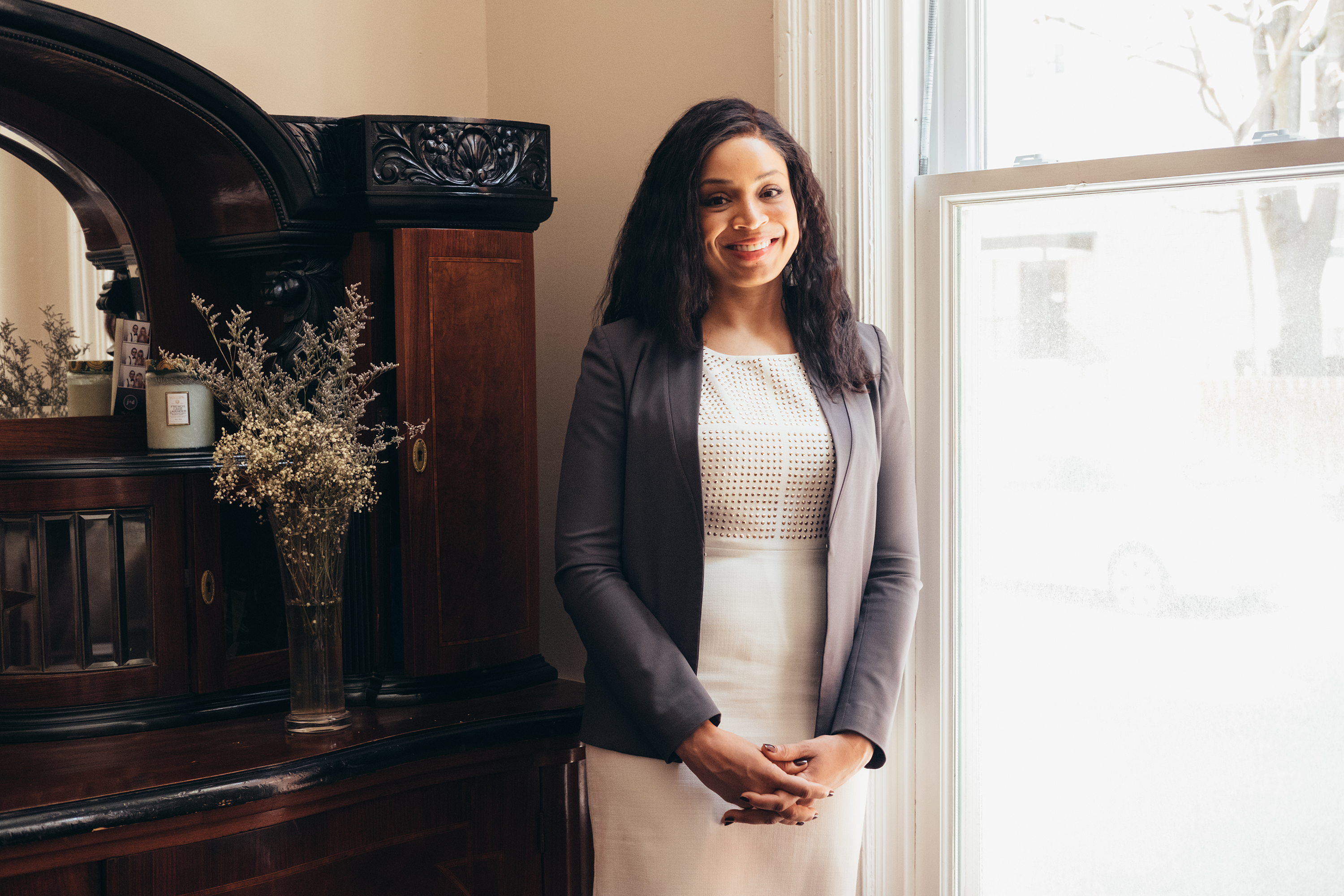International Relations grad Annamaria Enenajor is a leading advocate for Canadians with a criminal record for smoking cannabis. After all, it’s no longer a crime.
By Janet Rowe
♣
Annamaria Enenajor is remembering her favourite courses in International Relations at Trinity. She hung out at Trinity for hours, enjoying the beautiful buildings and cozy library en route to her honours BA (’06, from St. Michael’s College).
|
“What I really liked was being taught about key moments in time, but from various perspectives,” Enenajor says. “For example I would hear about the Second World War from the political perspective, the historical perspective, and then how it changed the economy. It was really interesting to learn about each event from different angles.”
|
That way of looking at things has informed Enenajor’s career – and her public policy work on fair jury composition and cannabis amnesty in Canada. Now a lawyer with Ruby Shiller Enenajor DiGiuseppe in Toronto (she made partner at just 33 years old), she looks at how individual pieces of the justice system have a wider impact, and how changing one piece can shift the entire picture.
Enenajor is all about systemic change, and Trinity was part of that journey. “Trinity was an opportunity to learn about the systems that make the world go round,” she says.
♣
Even before arriving at U of T, Enenajor had seen more of the world than most. As a child, she lived in Slovakia, Nigeria and finally Canada, where her family settled in Toronto. She carried that richness of experience into her studies, with a double major in International Relations at Trinity and Christianity and Culture at St. Mike’s, before earning a master’s degree from the Refugee Studies Centre from Oxford University.
“I think my international relations degree opened the door to refugee studies,” she says. “Refugees by definition are people who cross international borders. One of the last courses I took at Trinity focused on the economics of migration, and that really drew me into wanting to study that phenomenon more deeply.”
At the time, she had no idea she’d become a lawyer. But, she says, the idea soon felt natural. “When I began working with refugees [in India], I recognized that the concept of refugees is an artificial construct that we’ve created legally. To be able to better advocate for people who fit that legal definition, you have to be licensed to work within the system. It was an organic progression from international relations to where I am today.”
Enenajor earned her LLB at McGill University, then practiced government enforcement law in New York, where she helped bring a civil rights action in an effort to end the use of force against people held in city jails. Upon returning to Toronto, she joined Ruby Shiller and made partner in just two years.
It‘s been a winding road, but Enenajor sees that as an integral part of education. “In order to have an understanding of what you want to do, you have to educate yourself through experience,” she says. “Often the impression that we have about a profession doesn’t fit the day-to-day lived experience of somebody who is part of that profession. So it’s important to explore and take chances and try on different shoes to see which one fits.”
|
The lawyer shoes definitely fit.
“Every day I’m representing individuals who are facing the worst thing that’s ever happened to them – their liberty is at stake.”
|
Working with these clients is satisfying and worthwhile, but Enenajor also can’t help seeing how each individual case builds a bigger picture – and some of what she sees cries out for action.
♣
Take cannabis laws, for example. As part of her day-to-day experience, Enenajor saw how differently clients with cannabis-related charges were treated depending not on the merits of their case but on their social background.
“Smoking cannabis is one of those offenses that a lot of people do,” she explains, “but people with criminal records in Canada for cannabis possession are disproportionately African Canadians and Indigenous Canadians.”
In cities across the country, Black Canadians are far more likely to be arrested for cannabis possession than white Canadians. “The data we have shows that in Toronto, for example, you’re four times more likely to be arrested for cannabis possession if you’re Black than if you’re white,” says Enenajor. “It’s the same in Halifax, and in Winnipeg, and in Vancouver. And so there’s a discrepancy that runs along racial lines that I saw first-hand in my work.”
And in the courtroom, Enenajor saw people from privileged backgrounds managing to avoid consequences, while those from low-income backgrounds received a criminal record. “Here are people who did the exact same thing, have the exact same degree of moral culpability,” she stresses. “It seemed unfair. It really made me angry.”
What’s more, having a criminal record is a heavy penalty for racialized populations, who may already struggle to find employment. “For the rest of their lives they have to persuade people that they are worthy of a job, or a volunteer position,” she says. “That’s one of the reasons that the Campaign for Cannabis Amnesty was founded.”
Enenajor is the campaign’s director. Her team of seven lawyers, academics, industry professionals and activists have lobbied for the government to expunge the criminal records of the 500,000 Canadians with cannabis convictions, now that cannabis is legal.
“We’ve been advocating for expungement over pardons,” Enenajor explains. “Pardons allow the federal government to forgive people for past crimes if they’ve proven that they’ve reformed. Normally, it’s a $631 application fee. This government is offering an expedited and free version of that for cannabis possession offences. But our submissions to the House of Commons highlighted that pardons are not enough to address the historical injustice of disproportionate cannabis prosecutions. We want those offences to be permanently deleted from the record so they can never be reinstated.
Legislators listened, though they have not yet agreed to total expungement. Instead, Enenajor says legislators narrowed the circumstances in which a conviction for a previous cannabis possession can be reinstated.
♣
The rate of persons charged with a cannabis-related offence declined 16% from 2015 and of those charges the majority (76%) were possession offences. The only provinces not reporting a decrease in cannabis-related charges were Newfoundland and Labrador (+28%) and Prince Edward Island (+10%).
It’s a victory, if not a total one. Enenajor is still worried about issues such as U.S. border guard access to records, the fact that pardons are not an option if you have any other charge besides cannabis possession, and the fact that applicants still have to pay for fingerprinting and a background check, which is often cost-prohibitive.
“So we’re looking at how to partner with some organizations to assist us in setting up pardon clinics,” she says.
♣
In her work with the government, one thing stood out for Enenajor: “I’ve noticed is how great an appetite there is for accurate information. Our country is very serious about good governance, and we’re driven by trying to find out the right answer based on evidence. That’s one of the things that really has drawn me further into public policy.”
Systemic reform is where Enenajor hopes to make her mark. As a criminal defence lawyer, she is a daily witness of where and how systems, however lofty, fail certain individuals. ”That informs everything I do,” she says of her work. “Moving the dial from kneejerk, ideological reactions to crimes, to how the criminal justice system could improve people’s lives based on evidence rather than on fear. I think it would be short-sighted not to focus on systemic change.”
♣
Watch Annamaria speak on Midas Letter Live below




Sorry, comments are closed for this post.